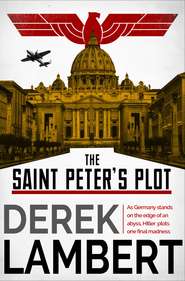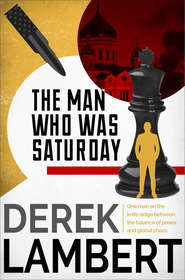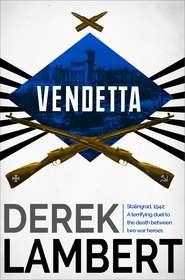По всем вопросам обращайтесь на: info@litportal.ru
(©) 2003-2024.
✖
The Yermakov Transfer
Автор
Год написания книги
2018
Настройки чтения
Размер шрифта
Высота строк
Поля
He opened the door and switched on the light.
Pavlov wasn’t surprised to see him: he wouldn’t have been surprised to see anyone. He shaded his eyes and said: “Good evening, Comrade Razin.”
“Good evening,” Razin said. “A pleasant surprise.”
“Pleasant,” Pavlov said. “But surely no surprise?”
The Tartar general glared down from the top bunk. “What now? What the hell’s going on?”
Razin said: “You must excuse me, General. I am only doing my duty. We have a very important guest on board.”
The general’s wife stuck her head out from beneath her husband’s berth. Her hair was in curlers and there was cream on her face. Her chest looked formidable. She said: “You’re surely not suggesting …”
Colonel Razin held up his hand. “I wouldn’t dream of suggesting anything. You and your husband are well known to us. But there are others in the compartment.”
The general and his wife stared at the breezy stranger and Pavlov knew that a small charade was about to be acted.
Colonel Razin said: “Can I see your papers, please?”
The stranger sighed and reached for his wallet. A smell of embrocation reached Pavlov: the stranger had been working on his cover – but he had forgotten to limp when he first arrived.
Colonel Razin thumbed through the papers while he addressed Pavlov: “I understand you’re meeting your wife in Khabarovsk.”
Pavlov, head on his hand, nodded. “First I have some business in Novosibirsk and Irkutsk.”
“You’re not the only one.”
“I know,” Pavlov said. “I hope to hear the speeches.”
“Do you, Comrade Pavlov? Do you indeed?” He handed the stranger’s papers back to him with a perfunctory “Thank you.” To Pavlov he said: “We must meet and have a drink for old-time’s sake. In the restaurant car, perhaps, at eleven tomorrow morning?”
“That would be fine,” Pavlov said.
“Are you making the whole journey?”
‘I’m leaving the train at Khabarovsk. I presumed you knew that, Colonel.”
Razin looked annoyed: he didn’t like to hear his rank used. Particularly in the presence of a general. Even if his status was superior when the chips were down.
Pavlov asked: “Don’t you want to see my papers?”
“It won’t be necessary. The husband of a Heroine of the Soviet Union shouldn’t suffer the indignity.”
He bowed as if he were in uniform, a Prussian officer’s bow. “Good-night, ladies and gentlemen. Pleasant dreams.”
After he had closed the door the general’s wife asked: “Is it true that your wife’s a heroine … ?” Her voice sounded as if her mouth was full of food.
Pavlov said: “I’ll tell you in the morning.”
He lay quietly listening to the soporific sound of wheels on rails – the 5 ft. gauge! Could anything go wrong before the plan was actually put into action? With the appearance of Colonel Razin one more imponderable had been used. He worried about it for an hour, then fell asleep. By that time it was 1.13 a.m. Moscow time and they were just leaving Kirov at the beginning of the second day of the journey.
* * *
The special coach was a mixture of styles. A functional office, two soft-class sleeping compartments for guards and staff, a K.G.B. control room with radio and receiving equipment for the microphones planted on the train, a cell, a larder and two compartments knocked into a large deluxe sleeper with mahogany panelling, thick pink drapes, a chair made of buttoned red satin, a Chinese carpet, washbasin and mirror with frosted patterns round the edge, a mahogany table and chair, and a bed with pink plush curtains controlled by a gold cord with a tassel.
Despite the luxury, the Kremlin leader couldn’t sleep. He lay alone, guarded in the corridor by two armed militia. It was always at night that the power left him to be replaced by doubt. He was sixty-six, entering the period of self-appraisal when the past presents itself for assessment. He saw the faces of those whom he had executed; he remembered the way he had hacked his way to absolute power. And he tried to equate it all with achievement: the prestige of the Soviet Union, the fear it struck into the bowels of other powers; the standard of living of the people. When he concentrated – when he recalled the tyranny of Tsarist days, the twenty million lost in World War II, the massive injustices of the Stalin era – the equation sometimes worked.
It was for these searching reasons – and the fact that a younger man was snapping at his heels in the Kremlin hierarchy – that he had decided to make the journey across Siberia. To see for himself the “heroic achievements” which his writers monotonously inserted into speeches until they had no impact at all and to re-affirm his popularity. But tonight he wasn’t so sure that it had been a good idea. He felt as if the train was plunging him into bloodshed and oppression. He thought of the camps on the steppes where enemies of the State still languished; he felt that when he looked out of the windows at the dark shadows that he was seeing his conscience drift past.
He turned to the diminishing future. He wished there was a God who would understand; but he had helped to banish him from the land.
He reached towards the table, a bulky figure in striped pyjamas, not impressive now during the naked small hours of the morning, and found his sleeping pills. He took one, held it on his tongue and washed it down with a draught of Narzan water. It burned for a moment in his stomach; then he slept to awake a leader once more.
* * *
The train nosed through the night, an express only in name, but inexorable with its steady speed, bumping a little but hardly swaying.
Soon it would reach the Urals, the gateway to Siberia. Near the Chusovaya River it passed a striped post, the boundary between Europe and Asia; on this boundary, at a point known as the Monument of Tears, the exiles used to bid farewell to their families before marching, manacled, into Siberia where the law was the three-flonged plet, where home was a sod hut and work was a mine sunk in perm frost. They had died by the thousand but millions had survived, the Russian way. And, with commuted sentences as the incentive, they helped to build the great railway carrying Train No. 2.
In the 1890s, five million were estimated to have travelled east to start new lives. There was another exodus between 1927–39; then, during World War II, as the Germans drove deep into European Russia, another 10½ million – the greatest evacuation in history.
When dawn broke the train was burrowing through valleys over which, it was said, there wasn’t a patch of blue sky without its own eagle.
CHAPTER 3 (#ulink_9f010441-bf24-5d2a-b7db-f8ead809b34a)
After queuing for half an hour Harry Bridges took his place for breakfast in the dining car. He sat opposite Libby Chandler and smiled at her.
“Look,” he said, “we might as well be friends.”
She smiled back. “Why not. I was tired yesterday.”
His professional instincts took over again. “And nervous?” She didn’t look so frightened this blue-and-gold morning; but he knew the fear was still there.
“Just excited,” she said.
He ordered a hard-boiled egg, coffee and toast. The waitress, wearing a tiara of paper lace, brought him a soft-boiled egg, tea and bread.
She laughed. “They’re not very efficient, are they?”
He jumped to the defence. “You’re not in Highgate Village now,”
She flushed. “I wasn’t ridiculing them. I’ve always admired the Russians.”
“You have? You’re one of the few. Most tourists see the Kremlin, the Winter Palace and GUM and go home complaining that there wasn’t a plug in their bath.”
“I’m not one of those, Mr. Bridges.”
“Harry,” he said. He dipped his spoon into his liquid egg. “It’s fear really,” he said. “People make fun of things they’re scared of. They made fun of the Kaiser and Hitler,” he added.
Другие электронные книги автора Derek Lambert
The Red Dove




 3.67
3.67
Vendetta




 0
0











